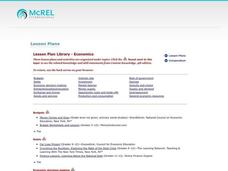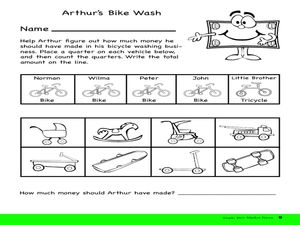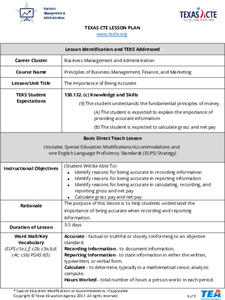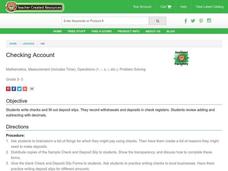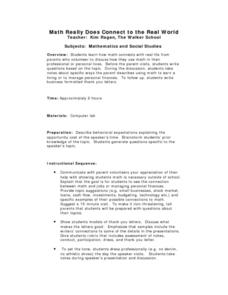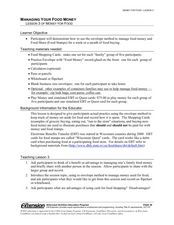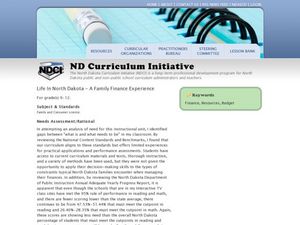Council for Economic Education
Opportunity Cost
The price of those new shoes involves more than just money! Individuals explore the concept of opportunity cost using a video clip and gratification discussions. They prepare a budget based off of their set of values in regards to...
Council for Economic Education
A Penny Saved
A penny saved is a penny earned! Scholars research the different ways to save money over a lifetime. They investigate the Rule of 72, compound interest, and sub-prime loans to gain an understanding of how banks aid in the saving process....
Curated OER
How Financial Institutions Help Businesses Grow
Learners study various forms of business organizations comparing and contrasting them to practices of the 1870's. They investigate the ways the businesses finance their transactions through loans.
Curated OER
RISKY BUSINESS--OR NOT!
Students learn about the importance and risk that stocks carry within a business. In this financial management lesson, students use role play and case scenario situations to decide what stocks are best for given companies. Based on the...
Curated OER
Invest In Yourself
Students learn about budgeting, saving, dept, financial management, opportunity cost, and self-regulation. For this financial management lesson, students apply their knowledge of finance components and create their own web based plan...
Curated OER
Micro Economics - Personal Budgeting
Students explore the real world as it relates to money and how people use it. In this money management lesson, students jump into the real world as they role play with money through spending, saving, being married, single, having...
Curated OER
Market Prices
Second graders understand that prices change. In this business, price and labor lesson, 2nd graders define the words market and price. Students read Arthur's Funny Money and answer questions related to earning and spending money....
Texas Education Agency (TEA)
Importance of Being Accurate
Accuracy is key! Using the detailed resource, scholars practice their presicion skills, taking online spelling and typing tests. Next, they demonstrate accuracy by calculating the gross and net pay of five hypothetical employees.
Curated OER
There's No Accountin with Ledgers
Tenth graders create and maintain a ledger, write an essay for the process, and learn to keep financial accounts through the ledger. For this ledger lesson, 10th graders define an accounting ledger and create one for the money they've...
Curated OER
Money Matters: The Importance of Global Cooperation
Students explore the International Monetary Fund (IMF). For this global economics lesson, students prepare for a field trip to the IMF as they examine the history of the IMF and their role in global trade.
Curated OER
A Basket of Bangles: How a Business Begins
Students consider concepts of banking introduced in the story, "Basket of Bangles." In this banking instructional activity, students identify key terms through recall questions interspersed in the story. Using five handouts and a game,...
Curated OER
Invest in Yourself
Students develop the concept of finances. In this finance lesson, students watch a video called, "Moving Out." Students calculate the finances of a character in the video. Students experience various budget scenarios such as earning...
Curated OER
There's No Accounting for Good Journals
Tenth graders create journals on their spending habits. In this money-management lesson plan, 10th graders create and keep journals of their personal income and expenditures. Students learn to use Excel to create a spreadsheet for their...
Curated OER
Checking Account
Students keep track of finances in a check register. In this checking account lesson, students practice writing checks and deposit slips as they add and subtract decimal amounts in order to balance a checkbook in a register.
Federal Reserve Bank
The Story of the Federal Reserve System
Prevent the Federal Reserve System from becoming a dry topic for your middle and high schoolers by using an informative, engaging resource! The cartoon takes your class on a journey with aliens from the planet of Novus to observe the...
Curated OER
Investing Money
Sixth graders participate in an simulated investment activity. They examine the purpose of different types of investments before they predict which will be the most successful. Finally, they simulate investing $1,000 in stocks, $1,000 in...
Curated OER
Math Really Does Connect to the Real World
Students listen to parent speakers who discuss how they use math in their professional or personal lives. They take notes and write business form thank you letters.
Curated OER
Grocery Shopping and Budgeting
Ninth graders establish a food budget based on individual needs and resources. They evaluate grocery stores and establish guidelines for purchasing specific foods.
Curated OER
There's No Business Like Bank Business
Students participate in a role play where they see how a bank works and how interest is paid by having money in the bank. In this bank lesson plan, students operate a bank and learn about saving, accounts, deposits, withdrawals,...
Curated OER
Mr. Popper's Penguin's
Fourth graders locate Antarctica and recognize it as the setting of Mr. Popper's Penguins. In this Mr. Popper's Penguins lesson plan, 4th graders understand the financial decisions made by Mr. Popper. Students discuss wise spending....
Curated OER
Managing Your Food Money
Students investigate family budgeting methods. In this family budget lesson plan, students examine the wages and expenditures of family and participate in a simulation that requires them to employ the envelope budget method.
Curated OER
Bank Comparison Activity
Pupils experience the responsibility of finding a bank that fits their needs. They describe the role of planning and maintaining a balanced budget. Students view brochures from various banks or websites to various banks.
Curated OER
A Family Finance Experience
Students create a budget and make predictions about money. In this algebra lesson,students balance spending and income by monitoring their finance.
Curated OER
Banking on the Future
Students solve problems involving interest. In this investing instructional activity, students investigate the pros and cons of investing in a bank account and stocks. They differentiate between aggressive and conservative investments.







